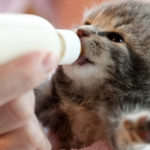According to
Cow’s Milk and Formula Milk Do Not Cause Early Puberty
The specialist emphasizes that the notion that consuming cow’s milk or formula milk can lead to early puberty in children is entirely mistaken. In reality, the hormones present in cow’s milk, which aid in milk production for cows, have no impact on the human body.
He clarifies that the hormones in milk are neither estrogen nor testosterone, nor are they reproductive hormones. Therefore, drinking cow’s milk and formula milk does not induce early puberty. “Stop blaming cow’s milk and formula milk,” the expert stresses.
Numerous global studies have been conducted on this topic, and scientists have found no evidence linking early puberty in children to the consumption of formula milk, powdered milk, or cow’s milk. So, if a mother faces challenges in breastfeeding, opting for formula milk is a reasonable decision for the child’s nutrition.

Scientists Have Found No Link Between Early Puberty and the Consumption of Formula, Powdered, or Cow’s Milk
However,
Adhering to this guideline is not only to prevent early puberty but also to ensure a balanced diet and comprehensive development for children. Research indicates that excessive milk consumption can limit children’s opportunities to consume a diverse range of other foods, leading to the risk of malnutrition and rickets, which is detrimental to their health.
Key Factors Contributing to Early Puberty in Children
Genetics
According to MedlinePlus (a service of the US National Library of Medicine), the most common genetic cause of early puberty is a mutation in the MKRN3 gene. Researchers also suspect that alterations in other yet-to-be-identified genes may be associated with this condition.

The Most Common Genetic Cause of Early Puberty is a Mutation in the MKRN3 Gene
Overweight and Obesity
Unhealthy eating habits, such as consuming fast food, physical inactivity, and spending excessive time sitting while using phones, watching TV, or using iPads, contribute to overweight and obesity in children.
These conditions can increase the risk of early puberty. According to WebMD research, fat cells in the body produce leptin, a crucial hormone. The higher the number of fat cells, the more leptin is produced. This hormone plays a vital role in regulating appetite, maintaining body shape, and influencing reproductive capabilities.
Although leptin does not directly trigger puberty, studies have shown that children need a certain level of leptin in their bodies for puberty to occur. Girls with higher leptin levels due to being overweight tend to experience early puberty more frequently.
Use of Cosmetics and Plastic Products
The frequent use of daily products like shower gel, shampoo, nail polish, and plastic food containers can cause endocrine disorders, which is one of the reasons for early puberty.
Animal studies have indicated that several chemicals are associated with early puberty, such as phthalates, commonly found in fragranced products like perfume, soap, and shampoo; parabens, used as preservatives in many cosmetic products; and phenols, including triclosan.
Many parents may not pay attention and allow their children to use adult soaps and shampoos or even let them wear makeup or nail polish. These practices should be reconsidered and restricted to prevent the risk of early puberty in children.
Should You Boil Condensed Milk Before Consumption?
Nutritious and versatile, condensed milk is a staple ingredient that can be transformed into a myriad of delicious treats. From beverages to desserts, a dash of this sweet, creamy milk can elevate any dish. Whether enjoyed straight from the can, mixed with warm water for a comforting drink, spread on biscuits, or added to coffee, condensed milk is a versatile pantry essential.
“The Ultimate Guide to Choosing the Right Formula for Your Picky Eater”
Introducing: The Ultimate Guide to Choosing the Right Formula for Picky Eaters. As a discerning parent, you understand the importance of optimal nutrition for your child. In this insightful article, we delve into the world of formula, exploring the essential components that cater specifically to the needs of picky eaters. From essential nutrients to flavor profiles, we’ll equip you with the knowledge to make informed choices, ensuring your little one receives the nourishment they need to thrive. Join us on this journey as we unravel the secrets to selecting the perfect formula for your fussy eater.
The Ultimate Guide to Choosing the Purr-fect Milk for Your Kitten and How to Mix it Right
Introducing the ultimate guide to choosing the best kitten milk and mastering the art of milk preparation for your furry friend’s well-being. Nurturing your kitten with the right milk and perfecting the art of milk preparation are essential steps towards raising a healthy and happy cat. Join us as we delve into the world of kitten nutrition and explore the secrets to selecting the finest milk and crafting the perfect milk formula. Together, we’ll ensure your kitten thrives and grows into a vibrant and energetic cat.




































